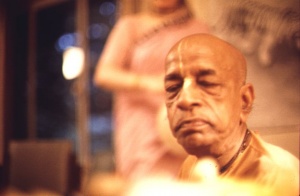CC Madhya 4.62 (1975)

A.C. Bhaktivedanta Swami Prabhupada
TEXT 62
- punaḥ taila diya kaila śrī-aṅga cikkaṇa
- śaṅkha-gandhodake kaila snāna samādhāna
SYNONYMS
punaḥ—again; taila diyā—with oil; kaila—made; śrī-aṅga—the body of the Deity; cikkaṇa—shiny; śaṅkha-gandha-udake—in water scented with flowers and sandalwood pulp and kept within a conchshell; kaila—did; snāna—bath; samādhāna—execution.
TRANSLATION
After the mahā-snāna was finished, the Deity was again massaged with scented oil and His body made glossy. Then the last bathing ceremony was performed with scented water kept within a conchshell.
PURPORT
In his commentary on this occasion, Śrīla Bhaktisiddhānta Sarasvatī Ṭhākura quotes from the Hari-bhakti-vilāsa. Barley powder, wheat powder, vermilion powder, urad dāl powder and another powder preparation called āvāṭā (made by mixing banana powder and ground rice) are applied to the Deity's body with a brush made from the hair at the end of a cow's tail. This produces a nice finish. The oil smeared over the body of the Deity should be scented. To perform the mahā-snāna, at least two and a half mānas (about twenty-four gallons) of water are needed to pour over the body of the Deity.